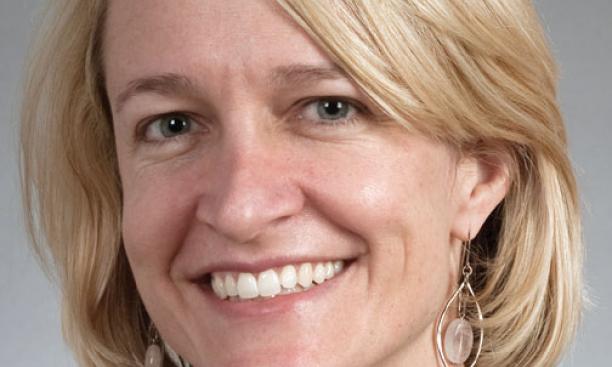

Assessing sprawling malignant cells was part of the daily routine for breast-cancer pathologist Kimberly Allison ’97, but nothing could have prepared her for the moment she saw her own cells magnified by the microscope. Already stunned by the stage-3 cancer diagnosis delivered by her colleagues only a few weeks before, it was a new shock, coming face to face with the enemy in her own body.
Cancer was familiar to Allison as a doctor, but in 2008 she began to learn about it from a different vantage point — that of patient. Her memoir, Red Sunshine (Hatherleigh Press), based on journals and a blog she kept at the time, draws on both perspectives and is a raw account of her treatment. “I thought this was an opportunity to really tell what it was like to go through this,” Allison explains, “from diagnosis, through a year of treatment, and all the steps along the way. What is it like to get a port? What is it like to get radiation?”

Because of her training, Allison felt comfortable with the medical system and had a general idea of what to expect. “I knew right away I was going to have to get chemo, and I knew I was going to have to have a mastectomy,” says Allison, who is director of breast pathology at the University of Washington Medical Center in Seattle. While her background gave her knowledge, it could not erase uncertainty and anxiety. “It didn’t change the fear. It didn’t change the ‘oh my gosh, how am I going to survive this?’” When she was diagnosed, she was a 33-year-old mother still nursing her 7-month-old son.
Allison is candid about the effect cancer had on her relationships. She describes the sometimes-frustrating differences between the ways she and her husband handled her illness. He was much more focused on action, while at times she wanted more empathy. But their relationship benefited unexpectedly from the intimacy of their “dates” when she received her chemotherapy. She grew closer to her mother and mother-in-law, who helped care for her two young children. And she was pleasantly surprised at how many people from her past came to show support.
Today, Allison is cancer-free. She recently ran a half-marathon and feels healthy and energetic. The lessons from her experience continue to ripple through her life, and her attitude toward her work has changed: She’s more aware of the patient when she peers at cells under a microscope and reports biopsy results more quickly, knowing “how terrifying it is waiting for a result.” She encourages women with breast cancer to talk about their experiences with other cancer patients and survivors. “And keep living through the experience,” she says. “Whether you’re diagnosed with stage 4 or stage 1, you’ve got to keep living your life.”
WHAT SHE’S READING NOW: Katherine Malmo’s Who In This Room: The Realities of Cancer, Fish, and Demolition
What she likes about it: Malmo’s writing is “lyrical, observant, and honest. Part memoir, part short story, it pushes the boundaries of autobiography and creative nonfiction.”
Because of her training, Allison felt comfortable with the medical system and had a general idea of what to expect. “I knew right away I was going to have to get chemo, and I knew I was going to have to have a mastectomy,” says Allison, who is director of breast pathology at the University of Washington Medical Center in Seattle. While her background gave her knowledge, it could not erase uncertainty and anxiety. “It didn’t change the fear. It didn’t change the ‘oh my gosh, how am I going to survive this?’” When she was diagnosed, she was a 33-year-old mother still nursing her 7-month-old son.
Allison is candid about the effect cancer had on her relationships. She describes the sometimes-frustrating differences between the ways she and her husband handled her illness. He was much more focused on action, while at times she wanted more empathy. But their relationship benefited unexpectedly from the intimacy of their “dates” when she received her chemotherapy. She grew closer to her mother and mother-in-law, who helped care for her two young children. And she was pleasantly surprised at how many people from her past came to show support.
Today, Allison is cancer-free. She recently ran a half-marathon and feels healthy and energetic. The lessons from her experience continue to ripple through her life, and her attitude toward her work has changed: She’s more aware of the patient when she peers at cells under a microscope and reports biopsy results more quickly, knowing “how terrifying it is waiting for a result.” She encourages women with breast cancer to talk about their experiences with other cancer patients and survivors. “And keep living through the experience,” she says. “Whether you’re diagnosed with stage 4 or stage 1, you’ve got to keep living your life.”
WHAT SHE’S READING NOW: Katherine Malmo’s Who In This Room: The Realities of Cancer, Fish, and Demolition
What she likes about it: Malmo’s writing is “lyrical, observant, and honest. Part memoir, part short story, it pushes the boundaries of autobiography and creative nonfiction.”
